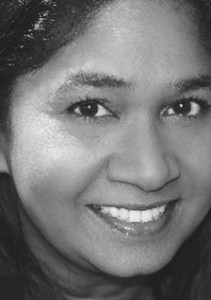Rasa Theatre’s Rani Moorthy Talks Verbatim
As a Sri Lankan Tamil, born in Malaysia but educated in Singapore, Rani Moorthy knows first hand the life as an outsider and one who has had to reinvent herself. States of Verbal Undress is her tenth play for Manchester-based Rasa Theatre. Combining verbatim interviews with her own writing, she describes it as an artistic response to current attitudes and prejudices towards immigrants. She talked to me about the challenges and complexities of verbatim theatre.
Why did you choose to write about immigration using verbatim interviews?
I was inspired by African-American actress Anna Deavere Smith (star of Nurse Jackie, The West Wing and The American President) who interviewed people around America with the intention of performing the ‘true voice’ of America. She felt, like me, terribly outside the film/tv and theatre community because of not fitting in – the way you look, you don’t fit in to the expectation of what a black actress should be. She’s mixed race and always found it hard to be cast. I find it hard to be cast here, because being from a Tamil Malaysian background, it impacts things like the way I sound – how I’m speaking to you now is not how I would speak ‘back home’ – but we all go through a process of reinvention.
She was doing her play about the race riots in LA and she interviewed the Korean community and she said that inhabiting the voice of this Korean woman allowed her to really understand race from a different place. Something really struck me about that, so I invited three other artists to help do the intreviews and access voices that don’t often get heard in a British theatre context.
You and fellow performer Curtis Cole are also playing the parts – what are the challenges with verbatim?
You have to trust and honour the dignity of the person you have interviewed. Not to imitate but to physically explain the narrative and to try and capture the essence of the person, but not necessarily be completely authentic, because I think it’s nonsense to say that verbatim that it’s a completely truthful reproduction, you have to have some kind of intervention.
It was also an interesting exercise in how not to Anglicise and make proper grammatical sentences – that wasn’t the point of this. I wanted to stay true to how well people can communicate and negotiate the English language, which actually for a foreign speaker can be a real issue, because every rule that the English language has, it breaks it about five or six times. If you studied the English language like a foreign speaker – like I did, you really do come up against how confusing it can be.
And you’re both playing numerous characters cutting across race, gender and age?
It’s a big risk, it’s a big experiment, that’s what I find really exciting about this. If someone doesn’t go with us on the journey, if they sit down and think ‘Oh God I can’t believe this big Tamil woman can somehow convince me that she’s a slim built Tamil man who is talking about growing up in an asylum camp in Germany’, then it’s not going to work. But I think that most people come to ‘the space’ – it’s a kind of consecrated ground and it’s a sort of hidden contract that we share with the audience, which is to just accept that this is the premise – people generally go with it. If you think of how ridiculous some of the classic plays are – how quirky some of their openings are – the audience do just go with it.
We start with something funny, the citizenship test, which is a book that you study if you want to apply for British citizenship. A lot of Britons don’t know that this thing exists and how difficult it is. We start the show asking the audience some of the questions in the test and it’s very funny because you start to understand that it’s a very long winded, difficult and expensive process to become a Brit.
I never set out to write for any particular audience, but of all my shows, I feel this show is pretty classless because it’s pretty much walking down the street in contemporary Britain and listening to the sound scape.
States of Verbal Undress is now on tour. Details at www.rasatheatre.co.uk








Recent Comments